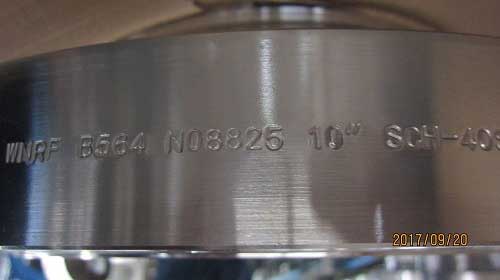Alloy 825-stabilized for optimal performance (Tech Center of Shanghai HY Industry Co., Ltd)
Alloy 825
-
Today, we will explore Alloy 825 and how to process and handle it under difficult conditions to provide the best performance.
-
INCOLOY alloy 825 is a material that can be used for a long time even under extreme operating conditions. This powerful nickel alloy is considered to be the pioneer of molybdenum-containing alloys, and the addition of molybdenum increases the strength of the material.
-
Because of its robustness, it is widely used in many volatile environments, including chemical processing, pollution control equipment, and the oil and gas industry. It is known for its excellent corrosion resistance, which is one of the reasons why it is used in many different industries.
-
Another reason this material is so popular among design engineers is that it works in a stable manner to achieve optimal performance. Over the years, the process has been optimized and perfected.
Handling and processing
-
Although Alloy 825 was introduced to the market 50 years ago, there are still many questions about the correct manufacturing, welding and heat treatment methods of the alloy.
-
Although the alloy is a conventional iron-nickel-chromium-molybdenum alloy, special attention must be paid to details during processing to ensure that the product develops the best metallurgical structure, mechanical properties and corrosion resistance for a given application.
-
In order to obtain the best performance, the alloy should be put into use under stable conditions. Proper machining and heat treatment are required to produce the microstructure required for optimal corrosion resistance.
-
Nickel-chromium-molybdenum alloys (such as INCOLOY alloy 825) are usually solution annealed at high temperature before use. Stable alloys provide the best corrosion resistance after annealing at lower temperatures. This process is commonly referred to as “stabilization annealing”. This is the standard supply condition for Alloy 825 products and is the key to successful alloy manufacturing. After solution annealing, the material is formed and welded. If the material is not properly “stabilized annealed”, it will not provide the best performance.
-
Choosing the right annealing temperature for the end use is the key. It helps to maintain the required high corrosion resistance, for example, in the chemical processing industry. In the final stage of processing and annealing, the temperature should be limited to 1700-1800°F (930-980°C). The optimal temperature for stability is 1725°F (940°C).
-
When the unstabilized alloy is subject to intergranular boundary corrosion, stable annealing heat treatment can be used to obtain the best performance.
Mechanical performance
-
 The purpose of all these treatments and optimizations is to maintain its impressive mechanical properties. All these make it an attractive material, especially considering that it can work at low to moderately high temperatures. Of course, in order to ensure the best performance, some restrictions need to be considered. For example, when exposed to temperatures exceeding 1000°F (540°C), the alloy may undergo microstructure changes, which can significantly affect ductility and impact strength. Therefore, this alloy is usually not selected as the material of choice for high-temperature working environments above 540°C. Above this temperature, creep rupture performance is a key factor in the design specification. Considering the correct operating conditions for this material, INCOLOY alloy 825 has many properties to choose from. Creep rupture performance can be greatly enhanced by cold working. Alloy 825 has good impact strength at room temperature, while maintaining its strength under low temperature conditions.
The purpose of all these treatments and optimizations is to maintain its impressive mechanical properties. All these make it an attractive material, especially considering that it can work at low to moderately high temperatures. Of course, in order to ensure the best performance, some restrictions need to be considered. For example, when exposed to temperatures exceeding 1000°F (540°C), the alloy may undergo microstructure changes, which can significantly affect ductility and impact strength. Therefore, this alloy is usually not selected as the material of choice for high-temperature working environments above 540°C. Above this temperature, creep rupture performance is a key factor in the design specification. Considering the correct operating conditions for this material, INCOLOY alloy 825 has many properties to choose from. Creep rupture performance can be greatly enhanced by cold working. Alloy 825 has good impact strength at room temperature, while maintaining its strength under low temperature conditions.
Industry Application
-
Stable and corrosion-resistant alloys (such as INCOLOY alloy 825) can be used in many end-uses where mechanical properties are ultimately required.
-
Especially in the chemical industry, the choice of materials is particularly tricky. A stable alloy for the best performance is essential to ensure that it can withstand the high pressure, corrosive environment and high temperature that are common under such difficult working conditions.
-
The chemical composition of the alloy makes it very suitable for use in the processing industry. Alloy 825 is stabilized by limiting the carbon content to a maximum of 0.05%. The alloy is further stabilized by its 0.6% to 1.2% titanium content. These elements, together with the main elements such as nickel, iron, copper and molybdenum, make this material very resistant to many corrosive chemicals commonly used in the industry. This includes sulfuric acid and phosphoric acid, as well as oxidizing and reducing substances.

